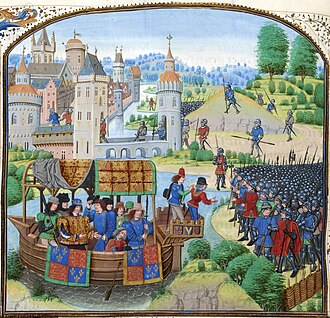
Back ثورة الفلاحين Arabic Uot Tayler üsyanı Azerbaijani وات تایلر عۆصیانی AZB Селско въстание в Англия Bulgarian Anglické povstání roku 1381 Czech Gwrthryfel y Werin Welsh Peasants' Revolt Danish Bauernaufstand von 1381 in England German Εξέγερση των Χωρικών Greek Angla kamparana ribelo Esperanto
| Peasants' Revolt | |||||||
|---|---|---|---|---|---|---|---|
 The boy-king Richard II meets the rebels on 14 June 1381, in a miniature from a 1470s copy of Jean Froissart's Chronicles. | |||||||
| |||||||
| Belligerents | |||||||
| Rebel forces | Royal government | ||||||
| Commanders and leaders | |||||||
| |||||||
| Casualties and losses | |||||||
| At least 1,500 killed | Unknown | ||||||
The Peasants' Revolt, also named Wat Tyler's Rebellion or the Great Rising, was a major uprising across large parts of England in 1381. The revolt had various causes, including the socio-economic and political tensions generated by the Black Death in the 1340s, the high taxes resulting from the conflict with France during the Hundred Years' War, and instability within the local leadership of London. The revolt heavily influenced the course of the Hundred Years' War, by deterring later Parliaments from raising additional taxes to pay for military campaigns in France.
Medieval historian Tom Johnson in 2025 describes the revolt as "the largest popular uprising in English history. It was the result of a series of inept short-term political decisions - military failures, financial corruption and the imposition of a third poll tax in four years - but it became a national emergency because of the extent to which government now intruded into its subjects' lives."[1]
Interpretations of the revolt by academics have shifted over the years. It was once seen as a defining moment in English history, in particular causing a promise by King Richard II to abolish serfdom, and a suspicion of Lollardy, but modern academics are less certain of its impact on subsequent social and economic history.
The revolt has been widely used in socialist literature, including by the author William Morris, and remains a potent symbol for the political left, informing the arguments surrounding the introduction of the Community Charge in the United Kingdom during the 1980s.
- ^ Johnson, Tom (20 February 2025). "Who plucked the little dog?". London Review of Books. 47 (3): 38.
© MMXXIII Rich X Search. We shall prevail. All rights reserved. Rich X Search